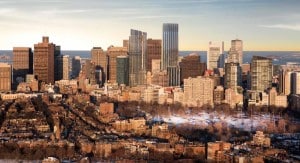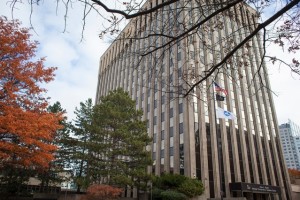
The master plan for the 161-acre Suffolk Downs property in East Boston calls for 16.5 million square feet of development including up to 10,000 housing units.
The development boom in Greater Boston showed staying power in 2017 as the region continued to attract commitments from major office and lab tenants.
Big leases by Alexion Pharmaceuticals, PTC and Rapid7 reflected the appeal of brand-new office towers in the Seaport and North Station neighborhoods, while life science companies looked beyond Kendall Square for growth. Class A office and lab markets continued to grow in inner suburbs such as Somerville and Watertown, driven by the expanding life science industry.
Apartment and condominium developers increasingly focused on outlying Boston neighborhoods and transit-friendly suburban neighborhoods. In Boston, officials prepared to debate regulations on the growing corporate housing and short-term rental market, while plans to rezone 250 acres in Jamaica Plain and Roxbury for high-density residential drew protests from housing advocates warning of further gentrification and displacement.
1. A Race to the Finish at Suffolk Downs
Years of speculation about the future of Boston’s most-watched development site culminated in HYM Investment Group’s $155 million purchase of the 161-acre Suffolk Downs racetrack property and its selection as local officials’ marquee choice to lure Amazon’s second headquarters. Developer Tom O’Brien floated two development plans for the property totaling 16.5 million square feet, including a “pro-commercial” version with 8 million square feet of office space to accommodate the e-commerce leader and 7,500 housing units. Whether or not Suffolk Downs survives the cut to the next round of Amazon’s site selection, the buildout is expected to take up to 20 years and create a new mini-city on the MBTA Blue Line, accelerating the transformation of East Boston.
2. Everybody Wants a Piece of Amazon

Massachusetts communities sent a total of 26 pitches in response to the e-commerce giant’s RFP for second headquarters. Pictured is the Hub on Causeway, part of the package of locations assembled by Somerville.
Communities across Massachusetts put their best spin on reasons Amazon should consider putting its 50,000 second headquarters jobs in their backyards. While the mayors of Boston and Revere touted Suffolk Downs, Somerville Mayor Joseph Curtatone pitched an “Amazon On The MBTA” scheme, piecing together sites along the Orange Line including Assembly Row, The Hub On Causeway and Cambridge Crossing (formerly NorthPoint). South Shore communities offered up the 1,400-acre Union Point site at the former South Weymouth Naval Air Station, where developer LStar Ventures landed its first commercial tenant in late 2016. Five Merrimack Valley communities touted the 168-acre former Lucent Technologies property in North Andover. Boston has been widely cited as a strong contender because of Amazon’s recent growth in the region, with a 150,000-square-foot office scheduled to open this year at 253 Summer St. in Fort Point and a possible requirement for another 500,000 to 1 million square feet of office space.
3. The Kendall Square Spillover Effect is Real

Cambridge Crossing, formerly known as NorthPoint, is approved for 2.1 million square feet of office and lab space and approximately 2,400 additional residential units.
Kendall Square’s booming life science and tech cluster sent ripples through surrounding submarkets as developers positioned new lab projects and converted office buildings to attract tenants unable to find the right space in East Cambridge.
With just a 3.9 percent vacancy rate in the 6.6-million-square-foot East Cambridge lab market, activity finally spilled over to the 45-acre Cambridge Crossing development site on the Boston and Somerville border. Developer DivcoWest broke ground on a 450,000-square-foot office and lab building, the largest speculative building ever built in Cambridge, and renamed the former NorthPoint property, which is approved for 2.1 million square feet of residential and commercial space.
In Brighton, the Boston Landing development leased virtually all of its lab space to tenants including Roche Diagnostics Operations, Proteostastis Therapeutics and Mass Innovation Labs. Developers Related Beal and Kavanagh Advisory Group kicked off construction of their 250,000-square-foot Innovation Square Seaport complex at 6 Tide St., after securing their own 54,000-square-foot lease from Mass Innovation Labs.
In Watertown, two life science companies committed to Boylston Properties’ speculative LINX office and lab complex at 480 Arsenal Way. Davis Cos. topped off its speculative 223,000-square-foot Alewife Research Center, which is scheduled for completion in fall 2018.
Along Route 128, Cambridge-based King Street Properties broke ground on a speculative 144,910-square-foot office and lab building at 828 Winter St. in Waltham and has begun permitting for a 209,000-square-foot spec lab building on its Hayden Research Campus in Lexington.
4. Millennium Tower Survives Sunshine Challenge

Millennium Partners’ proposed tower on the former site of the Winthrop Square garage won a significant victory with a shadow-bank exemption.
Demolition of the former city-owned Winthrop Square garage began in November as developer Millennium Partners prepares to redevelop the 1-acre property at 115 Federal St. as a 700-foot-tall office and luxury condo tower. While Millennium offered to pay the city up to $153 million contingent upon meeting its sales targets, it also had to convince Boston city councilors and state legislators to change a state law that limits new shadows on Boston Common and the Public Garden from development. The legislation was billed as a one-time exemption for Millennium, eliminating a “shadow bank” that other developers could have tapped into to avoid running afoul of the law in the future.
5. MIT’s Real Estate Empire Expands in Kendall Square
After getting the federal government’s endorsement to redevelop the U.S. Department of Transportation’s 14-acre Volpe National Transportation Systems Center property in Kendall Square, Massachusetts Institute of Technology laid out its vision for 1,400 housing units and 1.7 million square feet of commercial development. Cambridge city councilors endorsed a zoning petition that would allow one 500-foot residential tower and set aside 280 units for affordable housing. The zoning sets aside 5 percent of commercial space for entrepreneurship and incubators and requires that 65 percent of ground floor space contain retail or active uses.









